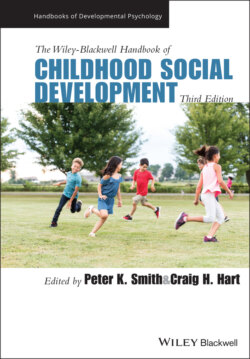Читать книгу The Wiley-Blackwell Handbook of Childhood Social Development - Группа авторов - Страница 88
New Possibilities?
ОглавлениеIt will be clear that the modern Western child, construed in the 18th and 19th centuries – the Enlightened child – disappeared in the second half of the 20th century, marking the end of the historical process of infantilization. Traditional upbringing, which was based on this infantilization, was referred to as “Bringing up by keeping small” in a much‐quoted publication of Dasberg (1975). In essence, it boiled down to setting the child apart from the adult world and leading it step by step into that adult world by what was called upbringing. This style of upbringing has become outmoded: infantilization is behind us in the sense that borders between childhood and adulthood are less strict and vaguer than ever. Mainly through electronic media, today’s children have access to the adult world from the beginning, including the world of violence and sex, areas in which children on the basis of the then current pedagogy were not allowed access for two and a half centuries. Given the child’s access to the internet, it is an improbable atavism that American parents as late as in 2006 pressed charges against teachers who persisted in marking school work with red ink (Stearns, 2009). The parents feared that the feeble self‐esteem of their vulnerable children would be damaged.
Raising children will have to be re‐invented. We are assisted by a tremendous amount of sophisticated and splendid studies on child behavior and on that of their up‐bringers. However, I would like to point out that all this research will only prove advantageous if we know what our objective is with regard to children, and that is what we are in the dark about. Worse still, modern academic pedagogy is hardly occupied with it. People who like me, who are followers of Kant’s much maligned successor, the educationalist Johann Herbart (1776–1841), are convinced that pedagogy as a science cannot do without ethics at the one hand and (developmental) psychology on the other (Herbart, 1841). The first helps to formulate objectives, the latter offers the means to achieve them. An evolutionary view like Bjorklund’s (2007), however relevant, will not help out. Bjorklund explained why a lengthy human youth is necessary to be able to adapt to an ever‐changing culture. This view only makes clear why we should cherish an extended explorative childhood, but not if and how it should be oriented.
Let us return for a final time to the example set by Rousseau. His incredibly effective book on education was a book on a new ethical person in a Utopian society. This very context turned his book into such a success. Of course, we are not in a position of again starting a revolutionary vision on child development. Nevertheless, we could – as Rousseau did – develop a vision of an ideal society in the spirit of which we would like to raise our children. In doing so, I recommend a restoration of the Enlightenment principles of rationality and autonomous and critical thinking; high‐grade ethical principles forming the basis of a modern “Contrat Social” (Rousseau, 1762); and commitment to a democratic society in which freedom of speech and inter‐human respect are balanced. All this needs to be worked out. However, it is good and reassuring to know that we can fall back on enlightened classical literature. But only when we have clear normative notions will we be able to profit from the rich modern empirical developmental psychology, that is today at our disposal.
This chapter hopefully demonstrates that understanding of childhood and child development is not fully and satisfyingly possible without studying the cultural historical context. Empirical analytical research is necessary, but not sufficient. Historical framing and reframing is the key to the contextual understanding of children. In short: what we need is a Historical Developmental Psychology (Koops & Kessel, 2017).
